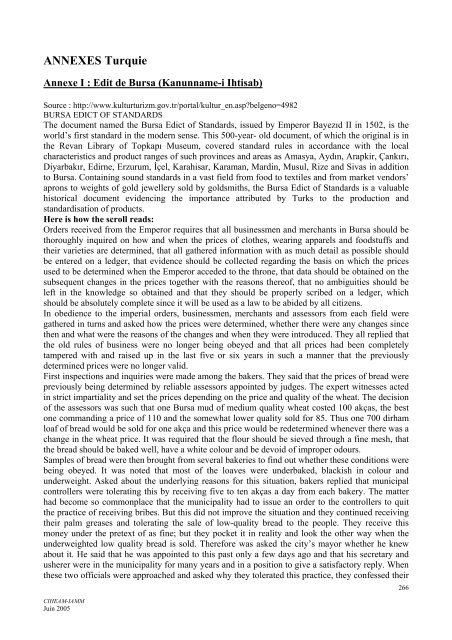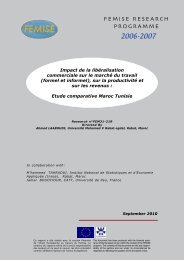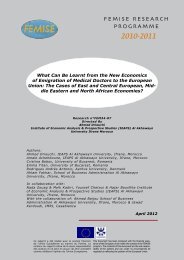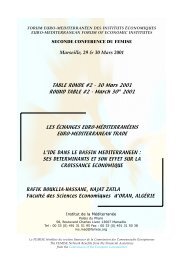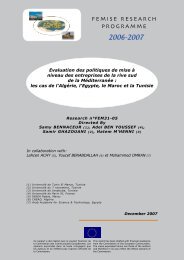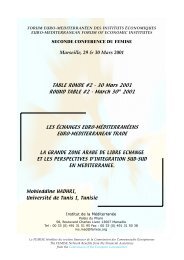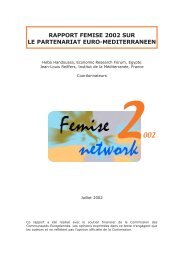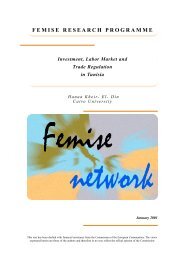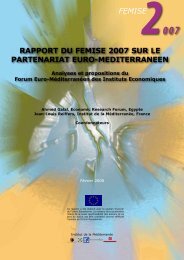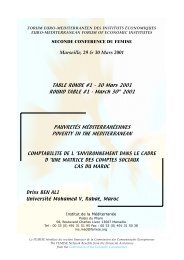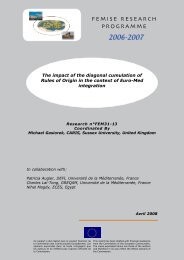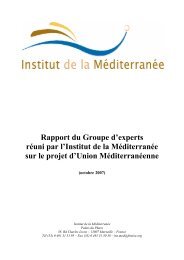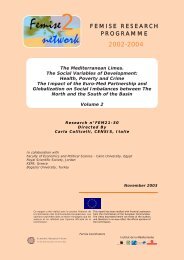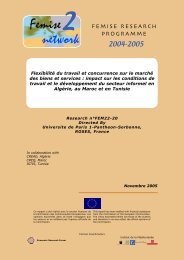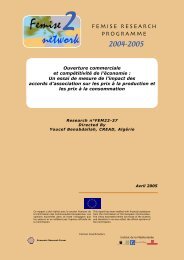Télécharger/Download (PDF, 298 p, 1,64 Mo) - Femise
Télécharger/Download (PDF, 298 p, 1,64 Mo) - Femise
Télécharger/Download (PDF, 298 p, 1,64 Mo) - Femise
You also want an ePaper? Increase the reach of your titles
YUMPU automatically turns print PDFs into web optimized ePapers that Google loves.
ANNEXES Turquie<br />
Annexe I : Edit de Bursa (Kanunname-i Ihtisab)<br />
Source : http://www.kulturturizm.gov.tr/portal/kultur_en.asp?belgeno=4982<br />
BURSA EDICT OF STANDARDS<br />
The document named the Bursa Edict of Standards, issued by Emperor Bayezıd II in 1502, is the<br />
world’s first standard in the modern sense. This 500-year- old document, of which the original is in<br />
the Revan Library of Topkapı Museum, covered standard rules in accordance with the local<br />
characteristics and product ranges of such provinces and areas as Amasya, Aydın, Arapkir, Çankırı,<br />
Diyarbakır, Edirne, Erzurum, çel, Karahisar, Karaman, Mardin, Musul, Rize and Sivas in addition<br />
to Bursa. Containing sound standards in a vast field from food to textiles and from market vendors’<br />
aprons to weights of gold jewellery sold by goldsmiths, the Bursa Edict of Standards is a valuable<br />
historical document evidencing the importance attributed by Turks to the production and<br />
standardisation of products.<br />
Here is how the scroll reads:<br />
Orders received from the Emperor requires that all businessmen and merchants in Bursa should be<br />
thoroughly inquired on how and when the prices of clothes, wearing apparels and foodstuffs and<br />
their varieties are determined, that all gathered information with as much detail as possible should<br />
be entered on a ledger, that evidence should be collected regarding the basis on which the prices<br />
used to be determined when the Emperor acceded to the throne, that data should be obtained on the<br />
subsequent changes in the prices together with the reasons thereof, that no ambiguities should be<br />
left in the knowledge so obtained and that they should be properly scribed on a ledger, which<br />
should be absolutely complete since it will be used as a law to be abided by all citizens.<br />
In obedience to the imperial orders, businessmen, merchants and assessors from each field were<br />
gathered in turns and asked how the prices were determined, whether there were any changes since<br />
then and what were the reasons of the changes and when they were introduced. They all replied that<br />
the old rules of business were no longer being obeyed and that all prices had been completely<br />
tampered with and raised up in the last five or six years in such a manner that the previously<br />
determined prices were no longer valid.<br />
First inspections and inquiries were made among the bakers. They said that the prices of bread were<br />
previously being determined by reliable assessors appointed by judges. The expert witnesses acted<br />
in strict impartiality and set the prices depending on the price and quality of the wheat. The decision<br />
of the assessors was such that one Bursa mud of medium quality wheat costed 100 akças, the best<br />
one commanding a price of 110 and the somewhat lower quality sold for 85. Thus one 700 dirham<br />
loaf of bread would be sold for one akça and this price would be redetermined whenever there was a<br />
change in the wheat price. It was required that the flour should be sieved through a fine mesh, that<br />
the bread should be baked well, have a white colour and be devoid of improper odours.<br />
Samples of bread were then brought from several bakeries to find out whether these conditions were<br />
being obeyed. It was noted that most of the loaves were underbaked, blackish in colour and<br />
underweight. Asked about the underlying reasons for this situation, bakers replied that municipal<br />
controllers were tolerating this by receiving five to ten akças a day from each bakery. The matter<br />
had become so commonplace that the municipality had to issue an order to the controllers to quit<br />
the practice of receiving bribes. But this did not improve the situation and they continued receiving<br />
their palm greases and tolerating the sale of low-quality bread to the people. They receive this<br />
money under the pretext of as fine; but they pocket it in reality and look the other way when the<br />
underweighted low quality bread is sold. Therefore was asked the city’s mayor whether he knew<br />
about it. He said that he was appointed to this past only a few days ago and that his secretary and<br />
usherer were in the municipality for many years and in a position to give a satisfactory reply. When<br />
these two officials were approached and asked why they tolerated this practice, they confessed their<br />
CIHEAM-IAMM<br />
Juin 2005<br />
266


